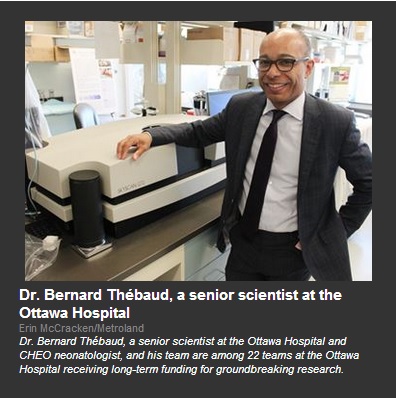Reported in the Ottawa South News
By Erin McCracken
It was 2005 when Dr. Bernard Thébaud told a mother her premature baby would die from lung disease.
“As I tried to explain what was the problem and … all the things that we were doing in the lab, she looks at me and says, ‘But isn’t there anything you can do for my baby now?’”
That’s when it hit the CHEO neonatologist: “She doesn’t care about the science behind this … all she cares about is if there is medication now,” he recalled. “And that changed everything for us in the lab.”
Since then, he and his research team have been dedicated to prioritizing their work on breakthrough treatments that show more immediate promise in saving lives of preemie babies and improving their quality of life into adulthood.
“From that day on I said my role is not to do fancy science,” said Thébaud, who is also a senior scientist at the Ottawa Hospital and professor in the department of pediatrics at the University of Ottawa. “I take what looks promising and take it into the clinic, and anything that seems further away from 10 years from the clinic we will not work on this.
“It’s not about doing the science for the science’s sake. It’s about driving the science and medication into the clinic.”
Thébaud’s team is among 22 at the Ottawa Hospital that were awarded more than $28 million on July 28 through a new grant offered by the Canadian Institutes of Health Research, the federal government’s health research funding agency.
“It’s a unique opportunity because instead of classical funding for three to five years for one project, it’s three projects for seven years,” Thébaud said. “It gives you the peace of mind to work and get the job done.”
Securing funding is the key to progress.
“This is the biggest challenge. In order to do extraordinary things you need extraordinary people and extraordinary people cost money,” said Thébaud, whose six full-time researchers are working to bring stem-cell treatments from the lab to the bedside.
That means freeing up Thébaud from grant writing to work on groundbreaking stem-cell treatments that can give preemies and full-term newborns with life-threatening lung diseases a fighting chance.
“That’s why I tell my students all the time … we’re here for the patients,” Thébaud said. “What you do in the petri dish has a real impact on the patients.”
His research was awarded $3.2 million for three projects that make his lab unique.
“We are one of the very few labs in the world that is banking on the therapeutic potential of these stem cells that may likely revolutionize medicine and we are (the only lab) working on three types of stem-cell products,” he said, which are showing potential.
The first product, which he hopes will go to clinical trial on 10 to 20 preemie patients in 18 months, would see potent mesenchymal stromal stem cells taken from umbilical cord blood and injected into patients – some of them born as early as 24 weeks or 16 weeks too early – who have chronic lung disease.
This condition affects 40 per cent of preemies, and later in life can cause premature aging of the lungs, early onset emphysema even if they never smoke a cigarette, or high blood pressure in the lungs.
These special stem cells have the ability to repair damaged lung tissue as well as promote lung growth.
Current treatments, such as mechanical ventilators, applying oxygen and use of a biochemical treatment, are limited.
“These therapies keep the babies alive but at the same time they damage the lungs,” Thébaud said.
The clinical trial is a critical step in making future advancements that could benefit adults as well, and apply the science to treat different life-threatening conditions.
“I compare it to the cellphones,” he said. “I see the stem-cell field like this right now. We’re working right now on the big clunky phone and in 10 years from now we’ll probably have slicker, better (mesenchymal stromal cells).”
The second project would see another type of cord-blood stem cell, known as endothelial progenitor cells, go to clinical trial in five years to demonstrate their ability to stimulate blood vessel growth and overall lung growth.
In the third trial, which Thébaud hopes to begin in seven years, any cells, like blood or skin cells, can be taken from anyone and changed in the petri dish into an embryonic-like stem cell or induced pluripotent stem cells.
“So this stem cell now has the ability to become any type of cell,” he said, adding he and his team have changed the diseased cells into healthy cells and reprogramed as lung cells.
“We have done this in animals … and for a certain type of mutation it looks really good. We can improve the lung function and the lung structure in mice,” Thébaud said.
Exciting times lie ahead within the next decade.
“I think we will see something amazing,” he said. “If it’s anything like what we see in the lab, this will be a game-changer. This will be transformative.
“Now the onus is on us to show that those cells can truly make a difference in the lives of these babies.”






